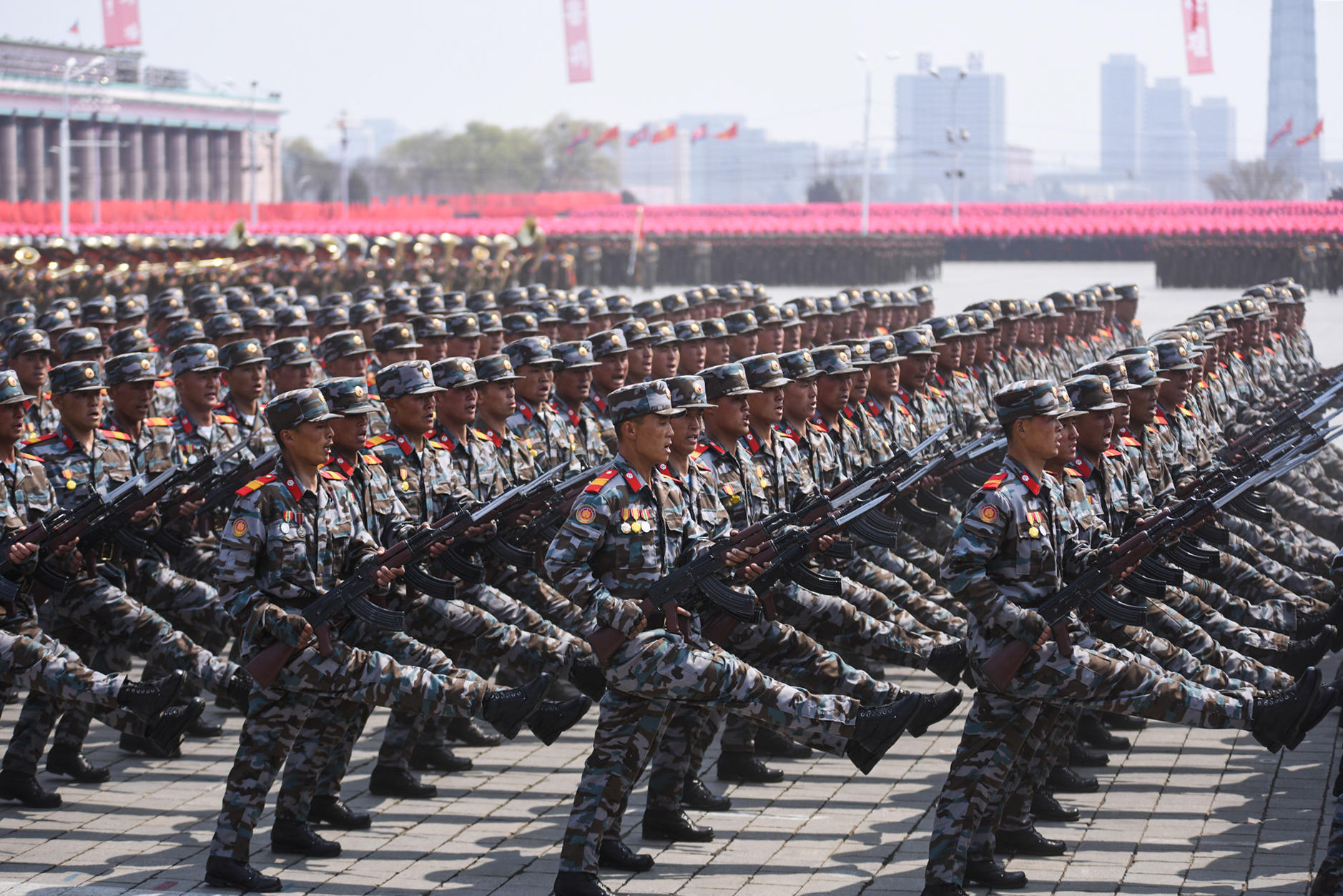
NORTH KOREA has raised the stakes in its standoff with the United States, threatening to retaliate with nuclear weapons if provoked by Washington.
The warning came as the rogue Asian state marked the 105th anniversary of the birth of its founding president, Kim Il-sung.
A huge parade displaying new intercontinental and submarine-launched ballistic missiles was held in Pyongyang amid speculation current leader Kim Jong-un could order a new nuclear test.
So, is the nightmare of a nuclear war in the region a possibility? Here, one expert explains the terrifying outcomes the brinkmanship could bring.
YET again North Korea is living up to its reputation as the world’s foremost nuclear flashpoint.
As the US President increases his rhetoric in an effort to actively counter the country’s nuclear brinkmanship, the potential for conflict – unwanted or not – appears to be rising by the day.
With North Korea celebrating the anniversary of its founder and Eternal Leader – Kim Il-Sung – this weekend, speculation is rife that the hermit kingdom will imminently carry out a further nuclear test.
Such an event would be used to portray the country as strong, autonomous and able to protect its people from aggressors, especially the United States with whom it fought a war from 1950-53, and in which an estimated 1.2 million soldiers from all sides (including China) were killed.
North Korea’s pugnacious attitude is nothing new, with the country widely seen as one of the most secretive, unpredictable and potentially-destabilising entities in international affairs.
But this latest tension appears different this time around.
In the past, North Korean belligerence has been countered by patient, if somewhat frustrated, diplomacy from Washington, with their primary strategic goal being to peacefully disarm and control Pyongyang’s weapons.
Now, however, the world’s most powerful country is led by the bombastic, aggressive and dominant Donald Trump, who is also prone to provocative, forceful and unpredictable behaviour.
In the months after his US election victory, he also repeatedly asked why he couldn’t use the country’s nuclear arsenal – seeing them as a form of leverage and foreign policy tool in a similar way to North Korea’s elite.
From this basis, there are now two wildcards in play concerning events on the Korean Peninsula, with both Kim Jong-un and Donald Trump pandering dangerously to their domestic audiences.
A range of eventualities now looks to be vividly imaginable. At their most benign, the war of words between the two sides continues, but with no further provocations. Greater international sanctions, especially from Beijing, aid peaceful efforts and force Pyongyang to back down.
Washington portrays such an outcome as a victory for strong-arm diplomacy.
Alternatively, North Korea leaders conduct another missile or nuclear weapons test that escalates regional tensions further.
Such a test may be inconsequential, but if US forces in the region are perceived as an existential threat to an isolated North Korean regime, Pyongyang may also launch a nuclear attack against US allies – South Korea and Japan.
Seoul is only 35 miles from the North Korean border, with Japan not much further away.
In such a scenario, and due to its longstanding treaties with Seoul and Tokyo, Washington would have to respond with clear military action in order to protect these countries, which could include invading North Korea.
President Trump may also attempt to determine events, buoyed by the sentiment that he is a tough, uncompromising leader.
He sends more military power to the region, which worsens tensions. Upping the ante further, especially if North Korea responds violently, the US carries out airstrikes to eradicate Pyongyang’s nuclear weapons, perhaps using the US’s own nuclear weapons.
If attacked in these ways, and if still able to respond, North Korea almost certainly launches all of its remaining nuclear weapons against the US and its regional allies.
The impact of a military conflict in the region would be catastrophic, leading to large numbers of casualties.
Refugees would flood across North Korea’s borders into China and Russia, putting pressure on local populations and increasing the risk of regional instability.
With East Asia embroiled in war, the region’s economic activities would also stall, as manufacturing, investment and business activities are severely disrupted.
Given Asia’s central role in driving the global economy, international trade would be impacted, leading to a serious global recession.
Such events would impact Scotland, as it would be unable to protect itself from a financial shock of such magnitude.
If any conflict were to persist, or at its worst, turn nuclear, such a downturn could become the defining hallmark of our time, with government revenues and spending dramatically reduced.
As with the rest of Britain and Europe, such economic implications could have significant, and destabilising, consequences.
Let us hope cool heads prevail, and that pragmatic peace conquers egotism and violence.
Chris Ogden is senior lecturer /associate professor in Asian Security at the School of International Relations, University of St Andrews. His latest book, China and India: Asia’s Emergent Great Powers, is out now.
10 Facts
- North Korea has a population of around 24.45 million.
- Its armed forces have around 1.19 million soldiers, sailors and airmen, plus around 600,000 reservists.
- Experts estimate North Korea has between 13 and 21 nuclear weapons.
- The capital, Pyonyang, has a population of 2.863 million.
- North Korea has its own time zone, Pyongyang time, which is 30 minutes behind South Korea.
- Men are required to model their hair on leader Kim Jong-un’s distinctive crop. Women are advised to copy his wife, the shy Ri Sol-ju.
- North Koreans born since the end of the Korean War are on average two inches shorter than South Koreans.
- Pyongyang boasts major roads which are 10 lanes wide – but largely empty of traffic. But less than 3% of roads in North Korea are paved.
- A 2015 study named North Korea as the most corrupt country in the world.
- North Korea ranks third in the world for meting out the death penalty, behind China and Iran – both of which have much bigger populations.

Enjoy the convenience of having The Sunday Post delivered as a digital ePaper straight to your smartphone, tablet or computer.
Subscribe for only £5.49 a month and enjoy all the benefits of the printed paper as a digital replica.
Subscribe